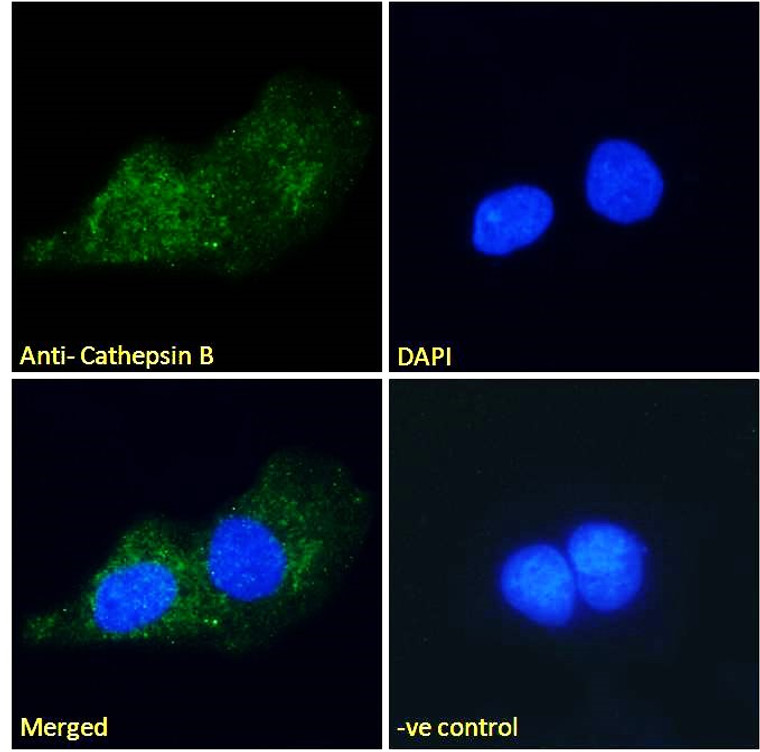| Host: |
Goat |
| Applications: |
Pep-ELISA/IF/IHC/FC |
| Reactivity: |
Human/Mouse/Rat/Dog |
| Note: |
STRICTLY FOR FURTHER SCIENTIFIC RESEARCH USE ONLY (RUO). MUST NOT TO BE USED IN DIAGNOSTIC OR THERAPEUTIC APPLICATIONS. |
| Short Description: |
Goat polyclonal antibody anti-Cathepsin B (Internal) is suitable for use in ELISA, Immunofluorescence, Immunohistochemistry and Flow Cytometry research applications. |
| Clonality: |
Polyclonal |
| Conjugation: |
Unconjugated |
| Isotype: |
IgG |
| Formulation: |
0.5 mg/ml in Tris saline, 0.02% sodium azide, pH7.3 with 0.5% bovine serum albumin. NA |
| Purification: |
Purified from goat serum by ammonium sulphate precipitation followed by antigen affinity chromatography using the immunizing peptide. |
| Concentration: |
0.5 mg/mL |
| Dilution Range: |
IHC-5µg/mlIF-Strong expression of the protein seen in the vesicles of HeLa and USO2 cells. 10µg/mlELISA-antibody detection limit dilution 1:64000. |
| Storage Instruction: |
Store at-20°C on receipt and minimise freeze-thaw cycles. |
| Gene Symbol: |
CTSB |
| Gene ID: |
1508 |
| Uniprot ID: |
CATB_HUMAN |
| Immunogen Region: |
Internal |
| Accession Number: |
NP_001899; NP_680090; NP_680091; NP_680092; NP_680093 |
| Specificity: |
All five transcript variants encode the same protein (NP_001899; NP_680090; NP_680091; NP_680092; NP_680093). |
| Immunogen Sequence: |
DELVNYVNKRNT |
| Function | Thiol protease which is believed to participate in intracellular degradation and turnover of proteins. Cleaves matrix extracellular phosphoglycoprotein MEPE. Involved in the solubilization of cross-linked TG/thyroglobulin in the thyroid follicle lumen. Has also been implicated in tumor invasion and metastasis. |
| Protein Name | Cathepsin BApp SecretaseAppsCathepsin B1 Cleaved Into - Cathepsin B Light Chain - Cathepsin B Heavy Chain |
| Database Links | Reactome: R-HSA-1442490Reactome: R-HSA-1679131Reactome: R-HSA-2022090Reactome: R-HSA-2132295Reactome: R-HSA-6798695 |
| Cellular Localisation | LysosomeMelanosomeSecretedExtracellular SpaceApical Cell MembranePeripheral Membrane ProteinExtracellular SideIdentified By Mass Spectrometry In Melanosome Fractions From Stage I To Stage IvLocalizes To The Lumen Of Thyroid Follicles And To The Apical Membrane Of Thyroid Epithelial Cells |
| Alternative Antibody Names | Anti-Cathepsin B antibodyAnti-App Secretase antibodyAnti-Apps antibodyAnti-Cathepsin B1 Cleaved Into - Cathepsin B Light Chain - Cathepsin B Heavy Chain antibodyAnti-CTSB antibodyAnti-CPSB antibody |
Information sourced from Uniprot.org
12 months for antibodies. 6 months for ELISA Kits. Please see website T&Cs for further guidance









